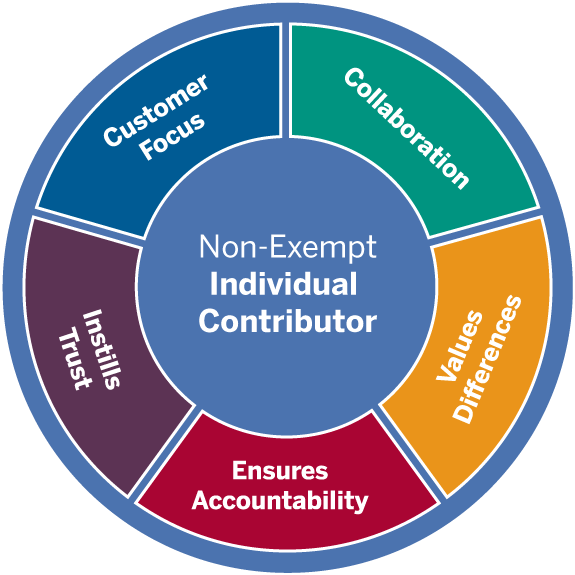Non-Exempt Individual Contributor: Intermediate
Being Resilient
Rebounding from setbacks and adversity when facing difficult situations
Setbacks are often unavoidable. Even the most resilient people experience setbacks. The difference is they anticipate them, meet them head-on, and have the ability to withstand them. Resilient people use their resilience to maintain control. They keep positive and believe there is a way forward even when it can’t be seen. They recover quickly, learn, and move forward. Resilience doesn’t come easy. It requires courage and commitment. The more resilient you become, the more you’ll stay calm under pressure and positively adapt to difficult situations.
You show this competency when you:
- Are confident under pressure
- Handle and manage crises effectively
- Maintain a positive attitude despite adversity
- Bounce back from setbacks
- Grow from hardships and negative experiences
How to develop this competency:
Push through it
Remember resistance is normal, not abnormal. Some of the time it’s legitimate, most of the time it’s just human nature. People resist until they understand. Don’t take it personally. Return to the facts and the agenda, keep making the business case, and invite the resisters in. Find out what is causing them to behave this way. Help them understand what is in it for them. Invite their ideas, input, and critique. Listen, adjust if you need to, then push ahead again.
Learn to manage stress
Stress can be caused by anything: your daily commute, a heavy workload, or even difficult customers. Unchecked, it can affect your productivity and, worse still, your health. Find out what situations cause you to become stressed and keep a stress diary. Make an entry after any stressful event. Note when it happened and how you felt about it. Was there any physical or emotional reaction? Review your diary entries regularly and establish what situations cause you the most stress. Some stress at work is unavoidable and resilience means recognizing and responding to your signals early.
Rediscover what matters
Is your heart not in it anymore? Is it hard to stay positive? Find your passion again. Make a list of what you like and don’t like about your current job. Concentrate on doing more of the activities you like every day. Do your least preferred activities first to get them out of the way; don’t focus on the activity but on your sense of accomplishment. Change your work activity to mirror your interests as much as you can. Volunteer for task forces or projects that would be motivating for you.
Learn more:
- Book: The Resilience Factor: Seven Keys to Finding Your Inner Strength and Overcoming Life’s Hurdles by Andrew Shatte and Karen Reivich
- Article: MindTools Developing Resilience
- Article: Seven Things Resilient Employees Do Differently
- Video: TED: The Game that can give you 10 extra years of your life
- LinkedIn Learning: Being Resilient course collection

Non-Exempt Individual Contributor
- Core Competencies
- Demonstrates Self Awareness
- Being Resilient
- Self-Development
- Resourcefulness
Foundational
Intermediate
Mastery
